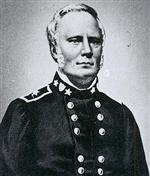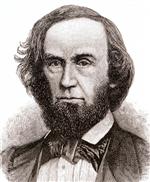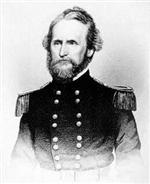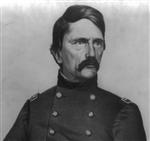Nathaniel Lyon Declares War


Following the Camp Jackson Affair, both sides immediately accelerated their plans for Missouri. Governor Claiborne Fox Jackson worked with the Missouri State Legislature to pass a bill authorizing the Governor to reorganize the State Militia into the Missouri State Guard. It also requisitioned funds for supplying the State Guard. Governor Jackson appointed Sterling Price as the Major General of the State Guard. They were called the “Butternut Boys.”[7]
This nickname was given to the State Guards because their only uniform consisted of everyday homespun that had been dyed a rather tired-looking brown with the aid of butternut juice.


The Missouri State Guard was still poorly organized and equipped. The Federals had over 10,000 armed troops. Jackson and Price realized they needed more time. Moderates in Jefferson City thought Brigadier-General Nathaniel Lyon was radical and rash and they were still interesting in preserving the peace. They convinced the Governor that he needed to meet with Lyon and Frank Blair. Similarly, moderates in St. Louis convinced Lyon and Blair that a meeting was necessary. Lyon issued a safe conduct to Jackson and Price for their visit to St. Louis. [8]
On June 10th, Governor Jackson and Major-General Price boarded a private train and traveled to St. Louis, registering at the Planter's House Hotel. On June 11th Brigadier-General Nathaniel Lyon, Colonel Frank Blair and an aide Major Horace Conant left the Saint Louis Arsenal and arrived at the Planter's House around 11 a.m. They met with Jackson, Price and the Governor's aide, Thomas L. Snead. [9]
When the meeting began, Lyon said he was going to let Colonel Blair conduct the meeting. During the ensuing discussion Price emphasized that the Price-Harney Agreement was still in effect and that Price planned to keep to his side of the agreement. Lyon was quiet for the first 30 minutes or so, but then proceeded to take over the meeting. It became clear that the degree of distrust on each side was too much to overcome. After four or five hours, Lyon said upon rising to leave: [10]
Rather than concede to the State of Missouri the right to demand that my government shall not enlist troops within her limits, or bring troops into the State whenever it pleases, or move troops at its own will into, out of, or through the State; rather than concede to the State of Missouri for one single instant the right to dictate to my government in any matter, however unimportant, I would see you, and you, and you, and you, [pointing to each man in the room] and every man, woman, and child in the State dead and buried. This means war. In an hour one of my officers will call for you and conduct you out of my lines.
Jackson, Price and Snead did not wait for Lyon's officers, but hurried to the Pacific Railroad depot and commandeered a train to take them to Jefferson City. They arrived there around 2:00 A.M. on June 12th. Along the way Jackson and Snead worked on a proclamation to be issued when they arrived in Jefferson City. Price also sent orders to burn the railroad bridges over the Gasconade and Osage Rivers behind them. Price also ensured the telegraph wires were cut. On June 12th, Snead issued the proclamation while Jackson directed the evacuation of the state government from Jefferson City. In conjunction with the Governor's proclamation, Major General Sterling Price issued orders to each military district commander of the Missouri State Guard to assemble their forces and have them ready for service. Price had convinced Jackson that Jefferson City was lost and their first line of defense should be in Boonville, Missouri, about 50 miles upriver. [11]
On June 12th, the day after meeting with Lyon and Blair at the Planter' House, Governor Jackson issued a proclamation to the people of the State of Missouri: [12]
A series of unprovoked and unparalleled outrages have been inflicted upon the peace and dignity of this Commonwealth and upon the rights and liberties of its people by wicked and unprincipled men, professing to act under the authority of the United States Government . . . I, Claiborne F. Jackson, Governor of the State of Missouri, do . . . issue this my proclamation, calling the militia of the State to the number of fifty thousand into the active service of the State, for the purpose of repelling [the Federal] invasion, and for the protection of the lives, liberties, and property of the citizens of this State.
